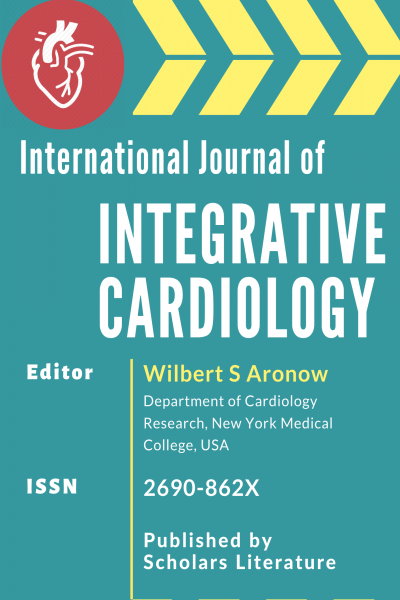Journal Highlights
The International Journal of Integrative Cardiology aims to cover the aspects related at all levels of cardiology and associated cardiovascular diseases. The journal also covers the diagnosis, prevention, and treatment of cardiovascular diseases. Additionally, the journal also includes the topics associated with tertiary cardiovascular health management and point-of-care.
Cardiovascular disease
Cardiovascular disease (CVD) is a general term that describes a disease of the heart or blood vessels. Blood flow to the heart, brain or body can be reduced because of a: blood clot (thrombosis) build-up of fatty deposits inside an artery, leading to the artery hardening and narrowing (atherosclerosis).
Interventional cardiology
Interventional cardiology is a specialty that diagnoses and treats heart and blood vessel conditions using small tubes called catheters.
Congestive heart failure
A chronic condition in which the heart doesn't pump blood as well as it should. Blood often backs up and causes fluid to build up in the lungs and in the legs.
Heart arrhythmia
Improper beating of the heart, whether irregular, too fast or too slow. Cardiac arrhythmia occurs when electrical impulses in the heart don't work properly.
Hypercholesterolemia
It is a lipid disorder in which your low-density lipoprotein (LDL), or bad cholesterol, is too high. This makes fat collect in your arteries (atherosclerosis), which puts you at a higher risk of heart attack and stroke.
Hypertension
A condition in which the force of the blood against the artery walls is too high. High blood pressure often has no symptoms. Over time, if untreated, it can cause health conditions, such as heart disease and stroke.
Atrial fibrillation
Atrial fibrillation is an irregular and often very rapid heart rhythm (arrhythmia) that can lead to blood clots in the heart. Atrial fibrillation increases the risk of stroke, heart failure and other heart-related complications.
Atherosclerosis
The build-up of fats, cholesterol, and other substances in and on the artery walls. Plaques may rupture, causing acute occlusion of the artery by clot. Atherosclerosis often has no symptoms until a plaque ruptures or the build-up is severe enough to block blood flow.
Metabolic cardiology
Field of medicine which concentrates on the prevention, management, and treatment of cardiovascular disease at the cellular level, through biochemical interventions that are native to the human body.
Cardiovascular aging
Cardiovascular aging is a process of functional and structural changes in older adults which can progress to cardiovascular disease.
Neurocardiology
Neurocardiology is the study of the neurophysiological, neurological, and neuroanatomical aspects of cardiology, including especially the neurological origins of cardiac disorders.
Psychocardiology
Health psychology that focuses on the primary and secondary prevention of heart diseases by incorporating strategies to address the emotional and behavioral barriers to lifestyle changes (e.g., smoking cessation), and that seeks to enhance recovery in cardiac patients by means of providing patients tools (e.g., stress management and psychotherapy) to cope with life and physical changes associated with their disease.
Cardiovascular medicine
Integrative approach to cardiovascular disease prevention and treatment that considers an individual’s genetics, lifestyle, and exposures as determinants of their cardiovascular health and disease phenotypes.
Preventive cardiology
It is a specialty of cardiology that helps you manage heart disease risk factors before they get worse. Preventive cardiology focuses on early prevention to keep heart and blood vessels healthy.
Clinical cardiology
Branch of medicine which deals with the specializes in diagnosing, preventing and treating heart diseases.
Interventional cardiology
Interventional cardiology is a non-surgical approach which uses a small, flexible tube called a catheter to repair damaged or weakened vessels, narrowed arteries, or other affected parts of the heart structure.
Cardiac physiology
Study of healthy, unimpaired function of the heart: involving blood flow; myocardium structure; the electrical conduction system of the heart; the cardiac cycle and cardiac output and how these interact and depend on one another.


